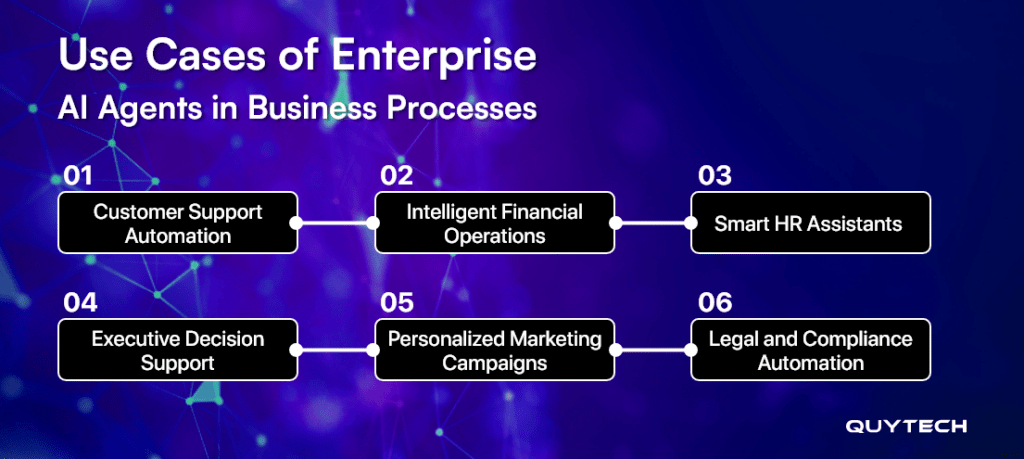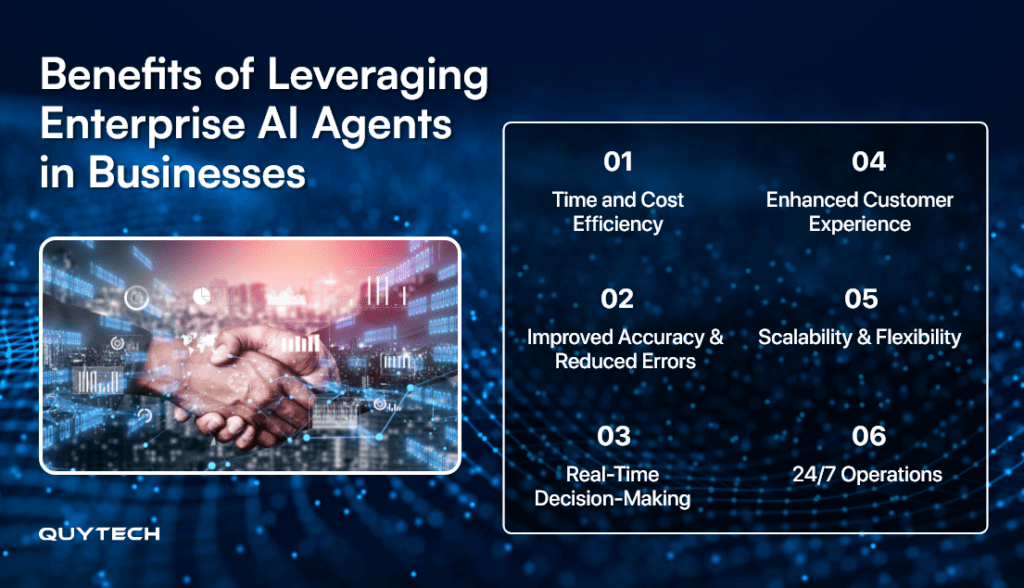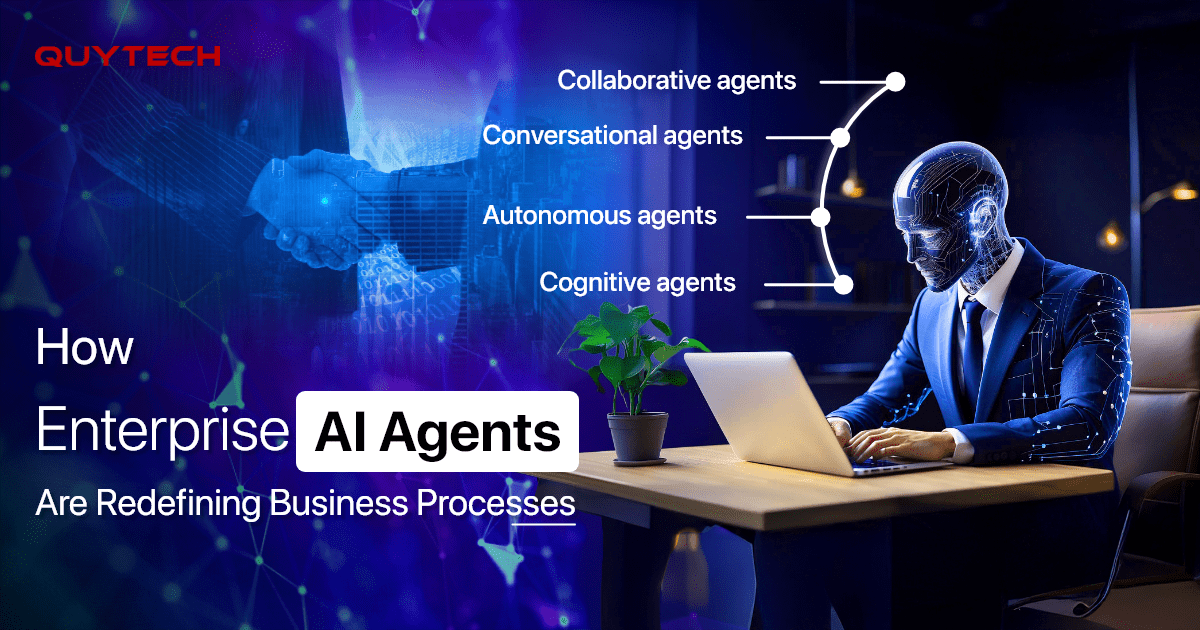Just a few years ago, if a business received thousands of customer queries a day, it meant that they needed to hire dozens of support agents to manage those queries in round-the-clock shifts, however, there was still a risk of delayed responses.
But today, things have changed dramatically. Let’s talk about Bank of America’s AI assistant, Erica, for example. Since its launch, Erica has successfully handled over 2 billion client interactions, helping customers check balances, schedule payments, and even manage subscriptions, without involving a human agent.
This isn’t a cooked-up story; it’s the reality of enterprise AI agents. These intelligent systems aren’t just chatbots that are gaining irrelevant hype. They’re capable of automating workflows, analyzing real-time data, making decisions, and collaborating with human teams across departments, ranging from finance and HR to supply chain and cybersecurity.
According to McKinsey, organizations that adopt AI-driven automation can achieve productivity gains of up to 40%, especially in repetitive, knowledge-based tasks. What was once manual, slow, and error-prone is now streamlined and strategic.
Want to know more about Enterprise AI Agents? Then, this blog is a must-read. In this blog, we have explained Enterprise AI Agents and how they are redefining the way businesses operate. So, let’s start.
What are Enterprise AI Agents?
Before moving forward, let’s first understand the Enterprise AI Agents. These are the AI-powered intelligent software systems that are designed to perform complex tasks. They are built exclusively for enterprises, hence the name Enterprise AI Agents.
In enterprises, there are many complex tasks that need to be done; however, require making strategic decisions, and sometimes, interactions with the team or systems within the organization.
So, Enterprise AI Agents are developed in a way that they use AI, machine learning, natural language processing, etc., to understand the context and learn from data, to operate autonomously or collaboratively.
There are several types of Enterprise AI Agents, such as:
- Autonomous agents that independently execute and manage complex tasks without human intervention.
- Collaborative agents that work alongside humans and offer them recommendations or other kinds of assistance.
- Conversational agents that communicate with users using natural, human-like language.
- Cognitive agents that simulate human reasoning to solve complex problems.
Now, let’s understand the differences between Enterprise AI Agents and traditional autonomous software.
| Feature | Enterprise AI Agents | Traditional Autonomous Tools |
| Learning Ability | Yes, they use machine learning/AI | No, they are rule-based/static logic |
| Adaptability | High; they adapt to new data & scenarios | Low; they have fixed workflows |
| Interaction Mode | Conversational, collaborative, decision-making | Predefined task execution only |
| Integration Scope | Cross-functional, enterprise-wide | Department-specific |
| Human Collaboration | They support hybrid workflows | They operate in isolation |
| Use Case Complexity | They handle complex and dynamic processes | They are limited to repetitive and structured tasks |
Role of Enterprise AI Agents in Business Processes
The role of Enterprise AI Agents is to provide support, automate, and improve numerous processes in enterprises. Their primary function is to enhance human capabilities, allowing for speedier decision-making, assuring consistency, and boosting process efficiency.
Moreover, they can act as autonomous decision-makers, collaborators, or consultants depending on the situation. These Enterprise AI Agents are also capable of monitoring activities, interpreting data, and responding to dynamic conditions in real time.
When integrated across systems and departments, they also contribute to enterprise-wide process continuity and coordination. Lastly, Enterprise AI Agents are fundamentally designed to streamline processes, decrease human effort, and help enterprises achieve strategic goals through intelligent automation and data-driven insights.
Use Cases of Enterprise AI Agents in Business Processes
The use cases of Enterprise AI Agents in business processes are as follows:

- Customer Support Automation
Enterprise AI Agents are used to handle customer queries in industries like retail, banking, and other industries. These AI Agents are used as 24/7 support assistants that solve common queries, process returns, and guide users through products or services.
With Enterprise AI Agents, businesses reduce wait times, improve customer satisfaction, and cut operational costs that would otherwise be invested in hiring customer support staff.
- Intelligent Financial Operations
Another use case of Enterprise AI Agents in business processes is managing financial operations and helping in making data-driven decisions.
In finance, Enterprise AI Agents are used by businesses to streamline work like automating invoice approvals, tracking cashflows, detecting fraud, and even creating financial reports, everything in real-time.
Moreover, some enterprises leverage fully autonomous agents to manage corporate treasury, forecast market movements, and dynamically allocate funds across global accounts based on risk appetite and liquidity goals.
- Smart HR Assistants
Enterprise AI Agents are transforming human resources by automating the HR processes, such as screening resumes, scheduling interviews, onboarding employees, and responding to internal queries about policies, leaves, or payroll.
Moreover, Enterprise AI Agents are also deployed across departments that analyze employees’ performances and industry trends and suggest training paths, promotions, or even new roles, which helps HR teams retain talent and improve workforce engagement.
- Executive Decision Support
In enterprises, business owners highly depend on Enterprise AI Agents while making strategic decisions. The Enterprise AI Agents act as real-time strategic advisors for the business owners, that analyze large datasets, identify trends, and simulate business scenarios.
Based on their analysis, they help business leaders make faster and data-driven decisions on operations, investments, market opportunities, and more.
Also, business owners use Enterprise AI Agents as co-pilots that simulate future business scenarios, like mergers, pricing shifts, or market entry strategies, based on real-time data and predictive modeling, and help them understand whether it would be successful or a failure.
- Personalized Marketing Campaigns
Enterprises use AI Agents to create and optimize marketing campaigns for better ROIs. The Enterprise AI Agents help marketing departments to segment audiences, recommend content, and automate email campaigns or ad delivery based on their users’ behavior.
Moreover, Enterprise AI Agents can also run and manage multichannel marketing campaigns autonomously, test creatives, adjust budgets, and even create marketing content that is highly optimized for individual customers.
- Legal and Compliance Automation
Among the top use cases of Enterprise AI Agents is automating legal and compliance. The Enterprise AI Agents assist in reviewing legal contracts, checking compliance standards, and flagging legal risks.
Moreover, Enterprise AI Agents are also deployed by businesses for smart negotiations. These agents review, redline, and finalize contracts by simulating both legal regulations as well as business goals.
Enterprise AI Agents in Different Industry Verticals
Here is how Enterprise AI Agents are used in various industries.
- Logistics and Supply Chain
Enterprise AI Agents are leveraged in logistics and supply chain to automate critical tasks like shipment tracking, route optimization, and inventory forecasting.
These agents analyze traffic data, weather, and carrier performance in real-time and ensure the timely delivery of products. Also, they streamline vendor communications, automate procurement, and flag potential disruptions before they occur.
Moreover, some Enterprise AI Agents can also autonomously handle customs paperwork, dynamically reroute shipments during delays, and even negotiate shipping contracts.
- Manufacturing
In the manufacturing industry, businesses employ Enterprise AI Agents for various purposes, such as predictive maintenance, quality control, and production planning.
Manufacturers rely on Enterprise AI Agents to continuously monitor machinery through IoT sensors to predict breakdowns and schedule proactive maintenance that minimizes downtime. They detect defects on the production line in real time using computer vision technology.
Additionally, Enterprise AI Agents assist manufacturers with inventory management, workforce scheduling, and process optimization across plants.
Some Enterprise AI Agents also run digital twins to simulate and test, and optimize entire production lines before physical deployment, helping manufacturers improve output, reduce waste, and adapt quickly to changing customer demands.
- Real Estate
Enterprise AI Agents are reshaping the real estate industry. Realtors leverage Enterprise AI Agents to automate property recommendations, virtual tours, and customer interactions.
These AI agents are used to analyze buyer behavior and market trends. Based on the insights, they offer personalized listings and pricing advice. They also assist real estate sales teams in lead qualification, document processing, and appointment scheduling.
Moreover, some real estate firms and developers also leverage Enterprise AI Agents that manage end-to-end real estate transactions, such as negotiating prices, generating contracts, and even overseeing post-sale property management, saving time and capital, and enhancing client satisfaction.
- Education and Learning
In both academic institutions and corporate environments, Enterprise AI Agents are redefining personalized learning paths based on a learner’s pace, interests, and performance.
The Enterprise AI Agents automate administrative tasks, such as grading, reminders, and content scheduling, freeing up educators and trainers to focus on teaching. Also, they provide real-time feedback and recommend resources tailored to individual learning styles.
In enterprises, AI Agents are used by businesses to assess employee skill gaps. After analysis, they suggest training modules and adapting learning paths based on employees’ roles or department goals.
- Energy & Utilities
Lastly, Enterprise AI Agents are transforming the energy and utilities sector by helping energy companies monitor grid health, detect faults early, and forecast energy demand based on historical usage and real-time data.
These Enterprise AI Agents automate maintenance alerts, balance load distribution, and even optimize energy storage systems. Moreover, they ensure operational stability while improving energy efficiency.
Benefits of Leveraging Enterprise AI Agents in Businesses
The following are the benefits of implementing Enterprise AI Agents in business processes.

- Time and Cost Efficiency
Enterprise AI Agents automate repetitive and time-consuming tasks, such as data entry, report generation, and customer query resolution.
They reduce the manual effort and enable businesses to save significant employee hours and operational costs.
Tasks that earlier used to take hours can now be done in seconds after deploying Enterprise AI Agents.
- Improved Accuracy and Reduced Errors
Enterprise AI Agents don’t suffer from fatigue or oversight. They execute tasks with high precision, whether it’s processing invoices, analyzing data, or reviewing documents.
This helps businesses to reduce or eliminate costly errors in operations, especially in finance, compliance, and logistics, improving overall output quality and reducing rework or regulatory risks.
- Real-Time Decision-Making
Another benefit of implementing Enterprise AI Agents is that they help businesses with informed decision-making. They process and analyze massive datasets in real time to deliver actionable insights.
Enterprise AI Agents help businesses make faster and data-backed decisions, whether they are related to monitoring market trends, operational metrics, or customer behavior, to outrun the competitors, and seize the opportunities.
- Enhanced Customer Experience
Enterprise AI Agents benefit businesses by enhancing customer experiences. These agents personalize interactions at scale by analyzing user behavior, preferences, and past interactions.
Integrated with chatbots and virtual assistants, these Enterprise AI Agents offer quick, relevant, and contextual responses that boost customer satisfaction, loyalty, and engagement.
- Scalability and Flexibility
Enterprise AI agents are very scalable and flexible. They can easily scale across departments or regions without significantly increasing operational costs.
Enterprise AI Agents can easily adapt to fluctuating workloads, making them ideal for growing businesses aiming to maintain consistency and speed without expanding headcount.
- 24/7 Operations
Enterprise AI Agents never sleep. They can operate continuously without breaks, ensuring round-the-clock productivity.
Enterprise AI Agents are very beneficial, especially for global companies, customer support, IT monitoring, or logistics tracking domains, where constant availability is needed to enhance user satisfaction and prevent downtime.
Conclusion
Enterprise AI Agents are autonomous systems used by businesses to streamline and automate their time-consuming daily processes. They are implemented to automate customer support, where they understand and solve customers’ problems. They help HR departments with hiring processes, and executives make data-driven decisions.
Moreover, Enterprise AI Agents are used to plan and manage finances efficiently, create marketing campaigns and optimize them, and even ensure that business processes are compliant with legal requirements and standards.
By implementing Enterprise AI Agents in business processes, owners can save time and effort, improve their operations’ accuracy, make real-time decisions, and enhance customer experience.
If you also want to reap these benefits, then contact Quytech to develop and deploy Enterprise AI Agents tailored to your business needs. We are the top AI Agent development company that has developed several AI Agents for companies like ExxonMobil, HP, Honda, Marks & Spencer, Eastman, and many others.
Frequently Asked Questions
Enterprise AI Agents are autonomous systems that are built to handle complex business operations. These agents go beyond static automation by using AI to make decisions, learn from data, and adapt over time. Unlike traditional automation tools, they operate autonomously across complex business scenarios.
Different types of AI Agents for enterprises are
– Reactive agents that respond to inputs.
– Goal-based agents that work toward defined objectives.
– Conversational agents, such as chatbots and virtual assistants.
– Collaborative agents that interact with humans or systems to complete tasks.
It may take several months to years to build Enterprise AI Agents. The development time depends on various factors, such as their purpose, complexity, features, development team, and more.
Organizations can measure the returns on investment (ROI) by tracking cost savings, process speed improvements, error reductions, and gains in customer satisfaction or employee productivity following the implementation of the Enterprise AI Agent.
Enterprise AI Agents can be highly secured when handling sensitive data when they are built with encryption, access control, and compliance with standards like GDPR, HIPAA, or SOC 2, ensuring safe data handling and risk mitigation.
Yes, Enterprise AI Agents can be implemented to assist human employees by handling repetitive tasks, flagging exceptions, offering insights, and enabling a human-in-the-loop approach for better decision-making and oversight.
You can reach out to Quytech to plan, develop, and implement Enterprise AI Agents into your business.



